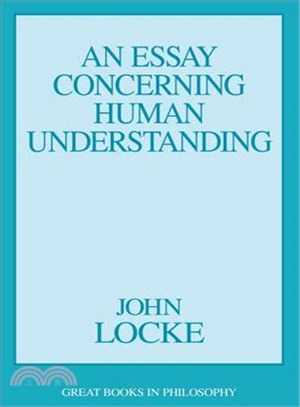An Essay Concerning Human Understanding
商品資訊
系列名:Great Books in Philosophy
ISBN13:9780879759179
出版社:Prometheus Books
作者:John Locke
出版日:1994/12/01
裝訂:平裝
規格:22.2cm*15.2cm*4.4cm (高/寬/厚)
商品簡介
作者簡介
相關商品
商品簡介
What is known? And how do we come to know it? These are the primary points of focus for metaphysics and epistemology, respectively. Here, in one of the classic works of early-modern empiricist philosophy, John Locke (1632-1704) attempts to answer these basic human questions by moving away from the rationalist notion of innate ideas to establish the concept of the tabula rasa in which the mind is initially impressed with ideas through perception of the external world of substance. The formation of basic ideas through the perception of primary and secondary qualities, and the more sophisticated development of concepts, is discussed as Locke departs from a purely mental view of knowledge to ground what we know in the firmer soil of empirical observation and in the mind's ability to interrelate ideas from perception. The careful reasoning of Locke's Essay has made it an enduring part of the history of of Western philosophy.
作者簡介
JOHN LOCKE?was born August 29, 1632, in Somerset, England, the son of landed English gentry. He entered Christ Church College of Oxford Univer-sity in 1652 and passed through the academic ranks quite uneventfully, later assuming a teaching post at the university. To escape ordination in the Church of England—a natural bureaucratic step toward university pro-motion—Locke took up the study of medicine and was transported into a new world of "natural philosophy" in which he associated with powerful scientific minds like that of Robert Boyle.
It was through his concern for the authority of the state in religious matters and the Natural Law used to support it that Locke became inter-ested in the role of Natural Law in experience—a curiosity that led him to philosophy, and more particularly to epistemology, as an avocation. Add to his interest in Natural Law the sociopolitical climate of seventeenth-century England—steeped in violent civil war, counter-revolution, restoration, deposition of the monarchy and the subsequent Parliamentary rule, and the eventual restoration of the monarchy late in the century—along with an intellectual stage dominated by the authoritarianism of Thomas Hobbes's?Leviathan,?and one can begin to sense the pressures at work on Locke.
After accepting a brief diplomatic mission to Madrid in 1665, Locke retreated to his teaching and medical experiments. His real political educa-tion was to come quite by accident as a result of an association with the first Earl of Shaftesbury, a wealthy and extremely powerful figure who had survived the vicissitudes of England's political turbulence. Initially employed as the Earl's medical advisor, Locke later became a permanent member of the household. It was here under the skillful tutelage of Shaftesbury that Locke matured as a social philosopher. The political intrigues in which the Earl was engaged caused Locke to be exiled, though he later returned to England after the Glorious Revolution that saw William and Mary placed on the English throne in 1688.
Locke's famous?Two Treatises of Government,?of which the second is most widely read, are an outgrowth of his original political proclivities, the sociopolitical chaos plaguing England during his lifetime, and his associa-tion with the Earl of Shaftesbury. Locke's dedication to individual liberty, government by consent, the social contract, and the right to revolt against governments that endanger the rights of citizens, has made him one of the most important political thinkers of the past four centuries. His legacy will live on as long as there are people fighting for freedom. He died in Oates, England, on October 28, 1704.
Some of John Locke's major works include:?A Letter for Toleration?(1689),?Two Treatises of Government?(1690),?An Essay Concerning Human Understanding?(1693),?Some Thoughts Concerning Education?(1693), and?The Reasonableness of Christianity?(1695).
It was through his concern for the authority of the state in religious matters and the Natural Law used to support it that Locke became inter-ested in the role of Natural Law in experience—a curiosity that led him to philosophy, and more particularly to epistemology, as an avocation. Add to his interest in Natural Law the sociopolitical climate of seventeenth-century England—steeped in violent civil war, counter-revolution, restoration, deposition of the monarchy and the subsequent Parliamentary rule, and the eventual restoration of the monarchy late in the century—along with an intellectual stage dominated by the authoritarianism of Thomas Hobbes's?Leviathan,?and one can begin to sense the pressures at work on Locke.
After accepting a brief diplomatic mission to Madrid in 1665, Locke retreated to his teaching and medical experiments. His real political educa-tion was to come quite by accident as a result of an association with the first Earl of Shaftesbury, a wealthy and extremely powerful figure who had survived the vicissitudes of England's political turbulence. Initially employed as the Earl's medical advisor, Locke later became a permanent member of the household. It was here under the skillful tutelage of Shaftesbury that Locke matured as a social philosopher. The political intrigues in which the Earl was engaged caused Locke to be exiled, though he later returned to England after the Glorious Revolution that saw William and Mary placed on the English throne in 1688.
Locke's famous?Two Treatises of Government,?of which the second is most widely read, are an outgrowth of his original political proclivities, the sociopolitical chaos plaguing England during his lifetime, and his associa-tion with the Earl of Shaftesbury. Locke's dedication to individual liberty, government by consent, the social contract, and the right to revolt against governments that endanger the rights of citizens, has made him one of the most important political thinkers of the past four centuries. His legacy will live on as long as there are people fighting for freedom. He died in Oates, England, on October 28, 1704.
Some of John Locke's major works include:?A Letter for Toleration?(1689),?Two Treatises of Government?(1690),?An Essay Concerning Human Understanding?(1693),?Some Thoughts Concerning Education?(1693), and?The Reasonableness of Christianity?(1695).
主題書展
更多
主題書展
更多書展今日66折
您曾經瀏覽過的商品
購物須知
外文書商品之書封,為出版社提供之樣本。實際出貨商品,以出版社所提供之現有版本為主。部份書籍,因出版社供應狀況特殊,匯率將依實際狀況做調整。
無庫存之商品,在您完成訂單程序之後,將以空運的方式為你下單調貨。為了縮短等待的時間,建議您將外文書與其他商品分開下單,以獲得最快的取貨速度,平均調貨時間為1~2個月。
為了保護您的權益,「三民網路書店」提供會員七日商品鑑賞期(收到商品為起始日)。
若要辦理退貨,請在商品鑑賞期內寄回,且商品必須是全新狀態與完整包裝(商品、附件、發票、隨貨贈品等)否則恕不接受退貨。
























